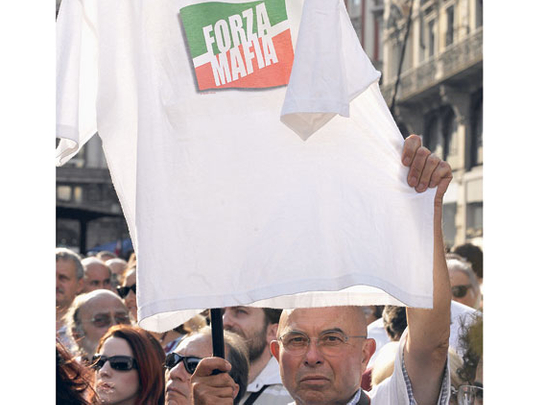
Rome: Silvio Berlusconi is sending out a message as he and his allies fall victim to a string of embarrassing phone call leaks: Stop listening.
The Italian premier is pressing a bill to limit the use of investigative wiretaps that have been the source of numerous scandals.
But there is fierce opposition to curbing official eavesdropping in one of the world's most wiretapped nations.
Magistrates have warned the contentious legislation winding through parliament may damage their fight against the Mafia, terrorism and paedophilia by severely limiting powers to conduct wiretaps.
Journalists denounce provisions that would ban them from printing wiretap transcripts as a breach of privacy, and called for a media blackout to illustrate the impact.
Newspaper journalists went on strike Thursday so papers couldn't come out the next day.
Most observers agree a problem does exist in Italy: too many wiretaps, their contents too readily made public, often in violation of privacy and without a clear connection to any relevant inquiries.
Wiretaps and leaked phone conversations are an important source of fodder for Italian newspapers.
Some of it is salacious, such as when the purported recordings of a call girl who claimed to have slept with Berlusconi dominated headlines last year for weeks.
In waging his battle against wiretaps, the scandal-plagued Berlusconi, who has been the subject of several corruption inquiries, has cast himself as an unlikely champion of democratic values.
"We are all spied on," the premier said recently.
"Do we realize that this is not a civilised country, that this is not real democracy? We can tolerate this no more."
But critics said what the premier really wanted was to protect himself and his allies.
"The real objective of this bill is to prevent the reporting of judicial cases that have a high political impact, the ones that can generate, and have generated, embarrassment," said journalists union president Roberto Natale.
International organisations including Reporters Without Borders have joined critics in denouncing the proposed the law as authoritarian.
Magistrates and journalists have been the object of scorn by Berlusconi — the former for numerous probes they have brought against him, the latter for publishing details of his private life. Italy is arguably one of the most wiretapped nations on the planet — but the estimates of how many people are being spied on electronically vary.
According Justice Minister Angelino Alfano, who drafted the bill, there were more than 100,000 authorised taps each year.
That compared to 20,000 people wiretapped a year in France, 5,500 in Britain and 1,700 in the United States, Alfano said when the bill was presented.
Italians, it seems, have grown accustomed to getting a glimpse of the lives of their rulers, and many simply shrug off the problem, saying that those who have nothing to hide don't care about wiretapping.
In recent months, most wiretaps leaked to Italian newspapers have emerged from a corruption scandal in which an Italian disaster relief agency is suspected of corruption in connection with contracts for last summer's Group of Eight summit.
Leaked conversations include a former public works official apparently discussing gay prostitutes with a Vatican choir member and a Brazilian masseuse saying her services to the disaster agency chief went no further than giving a massage.












